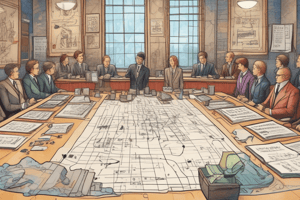Podcast
Questions and Answers
What does the function of controlling involve?
What does the function of controlling involve?
- Monitoring and evaluating performance to ensure goal achievement (correct)
- Identifying and addressing potential threats to the organization
- Allocating resources to meet organizational goals
- Developing budgets and tracking expenses
Which function of management involves developing risk mitigation strategies?
Which function of management involves developing risk mitigation strategies?
- Controlling
- Continuous improvement
- Risk management (correct)
- Budgeting
In the context of management functions, what is the purpose of continuous improvement?
In the context of management functions, what is the purpose of continuous improvement?
- Monitoring risk exposure
- Setting goals and guiding employees
- Identifying opportunities for enhancement and making incremental improvements (correct)
- Allocating resources to ensure goal achievement
Which function involves setting the direction for the organization?
Which function involves setting the direction for the organization?
What is the key aspect of budgeting in management functions?
What is the key aspect of budgeting in management functions?
Which function of management involves providing leadership and motivation to guide employees?
Which function of management involves providing leadership and motivation to guide employees?
What is the primary purpose of the planning function in management?
What is the primary purpose of the planning function in management?
Which function of management involves defining roles, responsibilities, and establishing reporting relationships?
Which function of management involves defining roles, responsibilities, and establishing reporting relationships?
What is the main focus of the staffing function in management?
What is the main focus of the staffing function in management?
Which function of management involves guiding, leading, and motivating employees?
Which function of management involves guiding, leading, and motivating employees?
What is the core aspect of the organizing function in management?
What is the core aspect of the organizing function in management?
In management, what does directing primarily involve?
In management, what does directing primarily involve?
Flashcards
Management Planning
Management Planning
Setting an organization's vision, mission, and goals, and deciding how to use resources to reach them.
Management Organizing
Management Organizing
Creating an organizational structure for communication and collaboration among employees.
Management Staffing
Management Staffing
Recruiting, hiring, training, and developing employees to meet organizational needs.
Management Directing
Management Directing
Signup and view all the flashcards
Management Controlling
Management Controlling
Signup and view all the flashcards
Management Budgeting
Management Budgeting
Signup and view all the flashcards
Risk Management
Risk Management
Signup and view all the flashcards
Continuous Improvement
Continuous Improvement
Signup and view all the flashcards
Organizational Goals
Organizational Goals
Signup and view all the flashcards
Key Performance Indicators(KPIs)
Key Performance Indicators(KPIs)
Signup and view all the flashcards
Employee Motivation
Employee Motivation
Signup and view all the flashcards
Strategic Objectives
Strategic Objectives
Signup and view all the flashcards
Study Notes
Management: Understanding Its Essential Functions
Management is a dynamic and multifaceted discipline that underpins the success of organizations worldwide. At its core, management involves the coordination and direction of resources to efficiently and effectively achieve organizational goals. To understand management's role, it's helpful to explore its fundamental functions.
-
Planning: Management begins by identifying an organization's vision, mission, and strategic objectives. Through planning, managers make informed decisions about the direction and allocation of resources to align the organization's activities with its goals.
-
Organizing: Organizing entails establishing an organizational structure to ensure efficient communication and collaboration among employees. This includes defining roles and responsibilities, delegating authority, and establishing reporting relationships.
-
Staffing: Staffing, also referred to as recruiting and hiring, involves selecting, training, and developing a workforce capable of meeting the organization's needs. This includes attracting and retaining top talent through competitive compensation, benefits, and opportunities for career growth.
-
Directing: Directing involves guiding, leading, and motivating employees to achieve the organization's goals. Managers set performance standards, monitor progress, and provide feedback to employees. This function is closely related to effective communication and relationship-building.
-
Controlling: Controlling involves monitoring and evaluating performance to ensure that the organization is achieving its goals. Managers establish key performance indicators (KPIs) and use data to make informed decisions about resource allocation and strategy adjustments. This function also includes addressing performance issues and providing corrective feedback.
-
Budgeting: Budgeting involves allocating resources to ensure that the organization can meet its goals within the constraints of its financial capabilities. Managers develop budgets, track expenses, and make adjustments to ensure that the organization stays on track financially.
-
Risk management: Risk management involves identifying and addressing potential threats to the organization. This function includes analyzing risks, developing risk mitigation strategies, and monitoring risk exposure.
-
Continuous improvement: Continuous improvement involves identifying opportunities for enhancement and making incremental improvements to the organization's processes and strategies. This function is closely related to innovation and adaptability.
These functions are interconnected, and effective management requires a strong understanding of how they work in conjunction with one another. For example, planning sets the direction for the organization, while organizing establishes the structure to support that direction. Similarly, staffing provides the workforce necessary to achieve the organization's goals, while directing provides the leadership and motivation needed to guide employees.
In summary, management is about setting goals, organizing resources, and guiding employees to achieve those goals. By understanding and applying the fundamental functions of management, businesses and organizations can improve their performance, drive innovation, and achieve sustainable success.
Studying That Suits You
Use AI to generate personalized quizzes and flashcards to suit your learning preferences.




